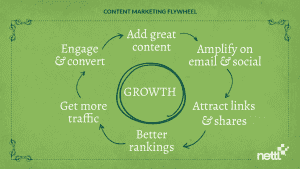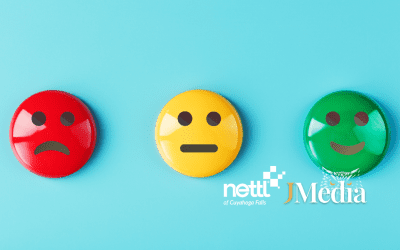A rewarding workout
You may have found yourself exercising more over the last 12 weeks.
Or maybe not. We’re not here to judge. Perhaps you’ve just ordered the leg warmers. And that’s ok. Or you’ve at least Googled about some kind of exercise. That’s a workout, right?
Maybe on your daily fitness search, you’ve stumbled across something called ‘Afterburn effect’?
A phenomenon where you go on to burn extra calories, as a result of your exercise, long after you’ve finished exercising.
Wouldn’t it be great if marketing did that too?
All too often, we get out of marketing what we put in. We identify an audience, do some activity, promote the message, and harvest the results. But it’s at least the same effort every time. For more or less identical rewards each time.
Most forms of marketing are often ephemeral and short-lived. Ads come and go, their attention-grabbing ability fading in and out like the music on an ice-cream van. There’s no longevity. No recurring reward.
We’re like lead farmers planting new crops every time for each new harvest. Wouldn’t it be nice if the same seeds we sowed delivered bountiful crops month on month, and even grew new plants that did the same?
Be more strawberry
Maybe a strawberry plant is something we can look up to while looking down at it.
A strawberry field can be picked clean only to come back within weeks. And these perennials last anywhere between 2 and 5 years.
Perhaps we need to be thinking less potato and more golden goose.
Compound interest
Over a green tea, Albert Einstein once told us that “Compound interest is the 8th wonder of the world. He who understands it earns it; he who doesn’t pay it.”
Compound interest is interest earned on interest. So, if you borrow $1000 and get charged $50 for interest, the following year you’re paying interest on $1050 ($1000 + $50). The interest amount gets added to the original loan.
On the opposite side of the coin, that loan is an investment. You’re making money on the $1000 you invested. The next year, you’re making money on $1050. And so on.
Wouldn’t it be great if marketing did that too?
Wait, is there an echo in here?
Yep. One piece of content, one single investment of effort, has the potential to deliver more and more value over time. Like the aforementioned golden goose, only this loosey-goosey gives you one egg the first month, two the second, four in the third.
That’s because, like compound interest, the gains from yesterday help attract tomorrow’s gains. The site benefits from more visitors, who share the content, which then gets more attention, often leading to more links, which improves rankings, and so attracts more visitors, who share the content… And round and round we go.
It’s a little like that fitness afterburn effect, only even better. Imagine burning calories each month for an exercise you once did last year. Recurring afterburn!
Ask any clucker though and they’ll say this laying eggs crack ain’t easy. And what we’ve described above is no walk in the park. It’s hard to start and needs some green-fingered SEO to maximize visibility. But once optimized, it works a bit like a flywheel.
What is a flywheel, though?
Let’s put our engineering hats on for a sec. In really simple terms, a flywheel works like this… Energy goes into the flywheel and makes it start to turn. Once it gets going, it spins faster and faster, storing energy in its spins. In a real mechanical flywheel, you could then reuse that energy.
So, a flywheel effect is about using the energy already generated, to drive more growth.
Amazon flywheel
Amazon used a flywheel model to strategize their growth. Coined ‘The Virtuous Cycle’ It focused on providing a large selection of goods online, delivering great customer service, which leads to more traffic, which attracted more sellers to the platform, offering a quality selection, and so on.
A bit like a snowball effect then?
A bit, yeah. A snowball effect is where a ball of snow increases in size as it rolls along. The extra snow it picks up each time helps it to add even more snow and build ever-increasing momentum.
Like flywheels, snowballs can take some time to get started too, but once a bit of size and shape is there, growth seems to get a bit easier.
Flywheels do outperform snowballs in milder conditions though. OK, that’s just a bad joke. But there might actually be some truth to the snowball effect only working in perfect conditions. The flywheel creates its environment. Plus, snowballs are slow. And the bigger they get, the harder they are to move. Unless they’re rolling downhill. But no hill lasts forever. So no, let’s stick to the flywheel.
A content marketing flywheel
Google loves fresh new content and people do too. As long as it’s worth their time. Not all content is created equal. Quality content is new, unique, useful, well presented, and customer-focused.
If you’ve been successful in building a content marketing flywheel then every new piece of quality content will take the same (or ideally less) effort. However, the reward will naturally become higher each time, as a result of the flywheel powering amplification.
You’re using the energy created from the already spinning flywheel, to feed attention back towards your site. Each new post you create benefits from the foundations laid by your previous work. Every previous connection opens the door to new connections.
Organic growth
A local car body shop expert creates some content on YouTube. She amplifies the video on social and maybe a few followers share the links. She gets a thousand or so views, a hundred likes, and a handful of subscribers.
The next video gets shown to more people. She receives some engagement and is encouraged to do some more videos on the same topic. These get more attention and she’s able to use the videos to build her reputation and start driving inquiries to her business.
The next time she posts content it reaches a lot more people, and the amplification compound effect continues.
A relocation firm creates a really good guide to moving to a new house. Posted on their social media this is quickly picked up by other companies in the property industry and shared. The article attracts links on related industry websites and discussion forums.
Brand awareness increases, rankings improve for all key search phrases, more visitors arrive, and the company feels it might be worth adding some more helpful guides to the website. Each time this happens, it builds trust, earns links, and increases brand awareness.
Inquiries are given a boost as that visitor, or someone they know begins looking for someone to help them move.
What other marketing efforts can you think of that deliver on the same principles?
Referral marketing perhaps?
We’d love to hear your thoughts. And with a global network of local marketers, we have a few of our own we’d be happy to share with you. Give us a call if you’d like to get started.









0 Comments